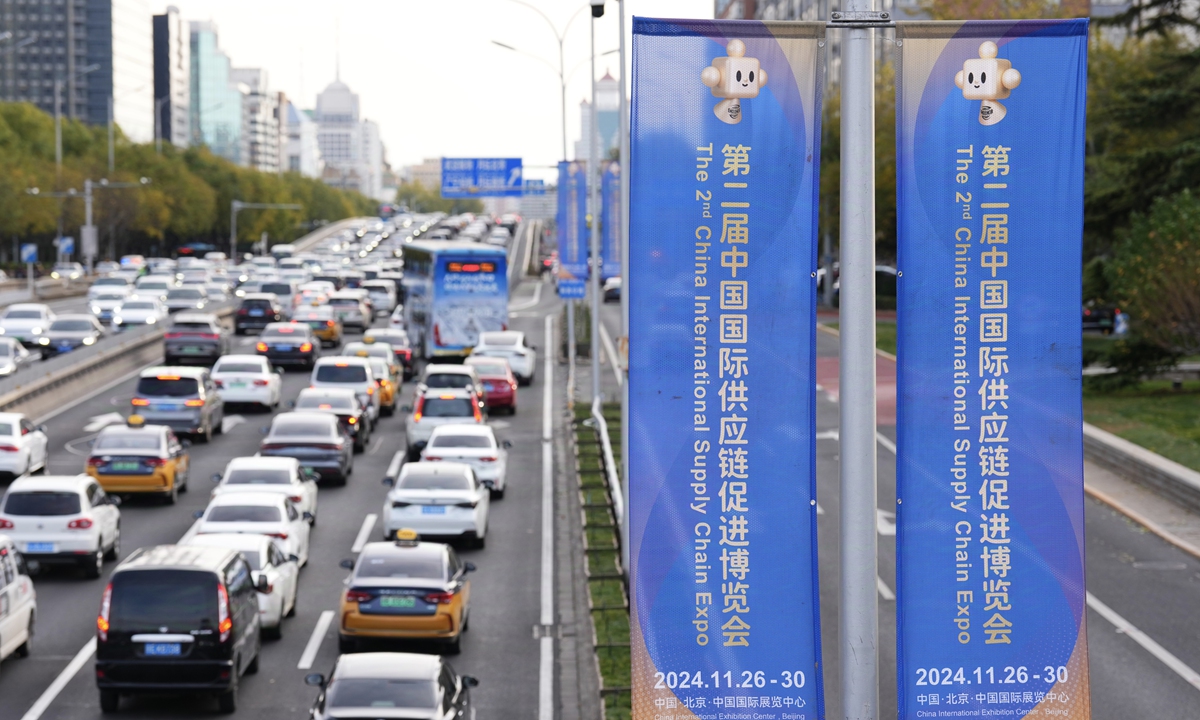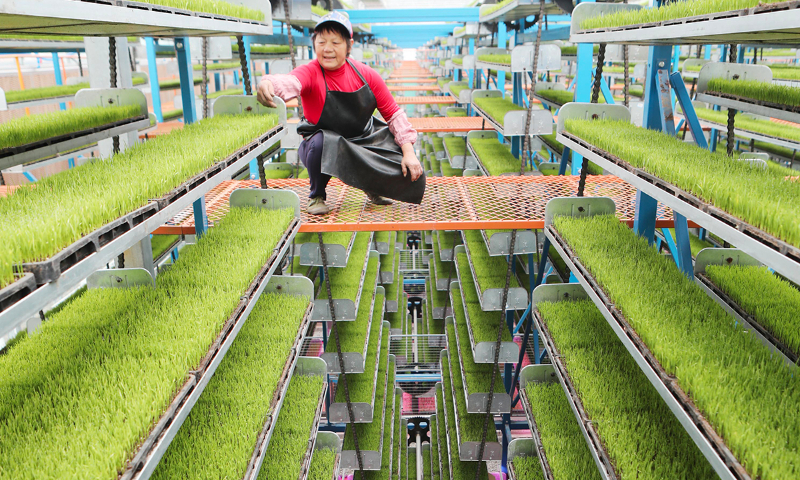
An expo visitor takes picture of a Tesla humanoid robot on display at the 2nd China International Supply Chain Expo (CISCE) in Beijing on November 27, 2024. Photo: Chen Tao/GT
At the ongoing 2nd China International Supply Chain Expo (CISCE) in Beijing, US companies have a prominent presence, as leading companies such as Apple and Tesla showcased their strong collaboration with Chinese partners and highlighted the importance of China in their supply chains. Experts said the enthusiastic participation of American companies in CISCE underscores the completeness and competitiveness of China's supply chain as a key attraction.
The prominent presence of US businesses at CISCE demonstrates their firm confidence in and commitment to the Chinese market, even as certain US politicians have been pushing for "decoupling," experts said.
There are more US companies participating in the expo than from any other foreign countries, according to expo organizer China Council for the Promotion of International Trade (CCPIT), which experts see as demonstrating the depth of supply chain collaboration between American firms and Chinese manufacturers.
At the booth of US technology giant Apple, a Global Times reporter observed that the company has brought four of its Chinese suppliers - Goertek, YUTO, Crystal Optech, and LY iTECH.
The four suppliers have brought their production facility or models to the expo to display their capacity in automated manufacturing and green production. Their products include packaging, phone cases, batteries and optical components, covering a wide range of accessories for Apple products.
"We are displaying our high level of automation at our plant and efficient plant management capacity," a staffer with LY iTECH told the Global Times on Wednesday.
An advertising board at Apple's booth said that "over 80% of Apple's 200 major suppliers manufacture in China" and "in the past five years, Apple has invested over $20 billion in smart manufacturing and green manufacturing in China."
US electric car maker Tesla exhibited various items, including electric drives, batteries and heat pump systems, humanoid robots, alongside the Model 3 and Model Y vehicles manufactured in Tesla Gigafactory in Shanghai.
Currently, the localization rate of components at Tesla's Shanghai Gigafactory exceeds 95 percent, with over 400 local first-tier suppliers contracted, more than 60 of which have entered Tesla's global supply chain system, Tesla told the Global Times in a statement on Wednesday.
The factory rolls out a complete vehicle approximately every 30 seconds, having delivered 676,000 vehicles in the first three quarters of 2024, accounting for more than half of Tesla's global deliveries during that period, Tesla said.
Tesla's efficient and rapid development has been significantly supported by the participation of the Chinese supply chain. At the same time, Tesla's success in the Chinese market has also driven swift growth of the upstream and downstream industrial supply chains, fostering a win-win collaboration among all parties involved, Tesla said.
US coffee shop chain Starbucks showcased coffee sourced from Southwest China's Yunnan Province at the expo. Today, Yunnan coffee beans are an integral component of every classic espresso served at over 7,600 Starbucks stores across the Chinese mainland, the company told the Global Times in a statement on Wednesday.
The success of Starbucks in China is bolstered by its dedicated team of 60,000 partners, thousands of Yunnan coffee farmers and a network of strategic suppliers and collaborators. Looking to the future, Starbucks is committed to deepening its engagement in the coffee supply chain, enhancing its sustainable practices, and collaborating closely with the Chinese market to create shared value, Starbucks said.
US personal computer (PC) maker HP showcased its innovative AI-powered PC and printing products and solutions at this year's expo.
Jason Juang, managing director of HP Greater China, told the Global Times on Wednesday that HP has always adhered to the development strategy of "in China, for China," and has continuously introduced advanced technology and management expertise into the Chinese market, providing consumers with continuously iterated high-quality products, boosting the digital upgrading of industrial and supply chains, and actively supporting the construction and development of China's information technology industry.
Attractiveness of Chinese market
Overseas exhibitors make up 32 percent of this year's CISCE, outpacing the share from last year with American companies taking the lead. The number of European and Japanese enterprises also significantly exceeded that of the first edition, according to expo organizer CCPIT.
The enthusiastic participation of American companies in CISCE underscores the completeness and competitiveness of China's supply chain as a key attraction, Bai Ming, a research fellow at the Chinese Academy of International Trade and Economic Cooperation, told the Global Times on Wednesday.
"China boasts a comprehensive industrial and supply chain system in the manufacturing sector, capable of providing high-quality and efficient manufacturing and services, with continuous improvements in supply chain levels offering numerous opportunities for foreign investment," Bai said.
The Chinese government remains committed to optimizing the business environment for foreign investment and promoting high-quality economic development. The stability and openness of Chinese policies have further enhanced international companies' confidence and expectations in the Chinese market, Bai added.
"The eagerness of American companies to participate in the supply chain expo indicates that their approach to advancing business is more grounded in commercial principles than in political factors," Gao Lingyun, an expert at the Chinese Academy of Social Sciences in Beijing, told the Global Times on Wednesday.
US politicians need to pay attention to and respect the evident willingness of American businesses for economic and trade cooperation by tailoring suitable policy environments for enterprises and contributing to the efficiency and prosperity of the global economy, Gao said.
On October 31, the CCPIT released its third quarter report on China's foreign investment business environment. The report reveals that 90 percent of the surveyed foreign enterprises expressed satisfaction with China's business environment, rating it as "satisfactory" or higher. Notably, 60 percent of American companies reported an increase in market attractiveness, marking a significant quarter-on-quarter increase of 15.26 percentage points.


